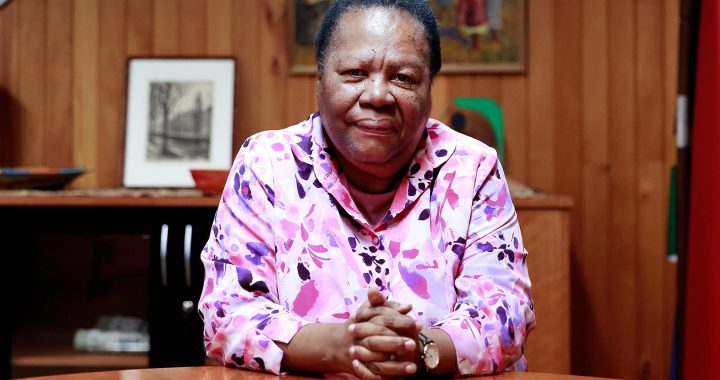SEXUAL VIOLENCE
Naledi Pandor appoints task team to tackle gender-based violence, sexual harassment on campuses

After academics from universities across SA wrote to Pandor in March 2019 highlighting the scourge of gender-based violence and sexual harassment on campuses, the higher education minister has appointed a ministerial task team to advise her.
Minister of Higher Education and Training Naledi Pandor has appointed a task team to help prevent sexual harassment and sexual violence at universities.
The task team members are: Lisa Vetten, Dr Babalwa Magoqwana, Professor Jackie Dugard, Professor Pumla Gqola, Dr Robert Morrell, Jerome September, Professor Malehoko Tshoaedi, Corinne Knowles and a student representative to be nominated by the South African Union of Students.
The appointment of the team, and the release of an accompanying policy framework for public comment, came after academics from universities across South Africa wrote a letter to Pandor in March 2019 highlighting gender-based violence, sexual violence and sexual harassment on campuses.
In their letter, the academics called on the department to ensure that steps were implemented to help prevent sexual harassment and sexual violence in university spaces. These included:
- A special investigation into the extent and scope of sexual offences, directed at both staff and students, in the higher education sector. The body undertaking the inquiry should report directly to the ministry;
- A register of offenders must be published on the Department of Higher Education and Training website for all higher education institutions to access and consult before posts are offered to new staff members;
- Blacklisting all those found guilty of a sexual offence to prevent them from joining any institution of higher learning after their guilt is determined;
- Standardising the resources of offices dealing with sexual offences in higher education institutions, taking into account the size of each institution;
- Establishing a charter of ethics that would be signed by all staff and students who assume positions of leadership in higher education institutions. The charter should clearly specify ethical conduct that pertains to the eradication of sexual harassment and violence; and
- Instituting quarterly reports through which all vice-chancellors disclose statistics on sexual offences collected in the various institutions. The disaggregation of the statistics should be standardised.
In April 2019, Pandor met some of the academics to discuss the letter and engage further.
“The meeting agreed that addressing sexual harassment and gender-based harm decisively will allow for a focus on ‘fundamental academic questions’ and restore ‘academic cultures that respect freedom and citizenship of all’,” Pandor said in Monday’s statement.
In addition to the task team appointment, the Department of Higher Education and Training has released for public comment a policy framework to address gender-based violence in the post-school education and training sector. The department has stipulated that once the framework is put in place it can help to address many of the concerns the academics raised in their meeting with Pandor.
“The vision of the policy framework is that “everyone has the right to live, study and work freely and safely in PSET institutions without any fear of sexual/gender-based intimidation, harassment, abuse, rape or other forms of sexual/gender-based harm,” Pandor’s statement said.
Task team member and Nelson Mandela University academic Dr Babalwa Magoqwana welcomed the release of the policy framework and the appointment of the ministerial task team members.
“I think it is long overdue. These investigations have been taking place since 2016. So we do welcome the panel, which will be working with the minister in dealing with gender-based violence on campuses in all its types and forms,” Magoqwana told Daily Maverick.
Fellow task team member Lisa Vetten, an honorary research associate at the Wits Institute for Social and Economic Research, said both the framework and the task team were a step in the right direction.
“Since 1984 people have been protesting about gender-based violence on campus. It has been years, so this is good,” said Vetten, who has worked in the area of violence against women for more than 20 years as a counsellor, paralegal, researcher and trainer.
“Look at all the universities and their outcry on the matter. This (policy framework and ministerial task team) suggests that something is being institutionalised and not being driven by outrage and protesting,” Vetten told Daily Maverick.
The policy framework is designed to guide the task team on how to deal with sexual harassment and gender-based violence on campuses. The team will advise the minister and the department on the following matters:
- The effective introduction and implementation of the policy framework to address gender-based violence, with a specific focus on universities;
- A possible inquiry into sexual harassment, gender-based violence and gender-based harm in the university sector, considering the work that has already been carried out;
- Measures to ensure that sexual offenders do not escape justice and repeat offences in other institutions;
- Appropriate levels of support to be put in place at public universities;
- Mechanisms and processes to report on sexual offences in the sector, in line with the policy framework, with a view to improving monitoring and reporting; and
- Other possible interventions to improve institutional responses to gender-based violence and sexual harassment.
Magoqwana said that even though this was a significant step in the right direction, more still needed to be done and no one should believe that the work was now done.
“It doesn’t end here, it is now up to the practices of our higher education so we can develop a different culture that can influence the practices and influence the cultures and, ultimately, influence the behaviour that can be welcoming to all in the post-schooling institutions. And hopefully, this can influence all in society because we know this forms part of a bigger societal problem,” Magoqwana said. DM



















 Become an Insider
Become an Insider